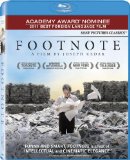| Reviews & Columns |
|
Reviews DVD TV on DVD Blu-ray 4K UHD International DVDs In Theaters Reviews by Studio Video Games Features Collector Series DVDs Easter Egg Database Interviews DVD Talk Radio Feature Articles Columns Anime Talk DVD Savant Horror DVDs The M.O.D. Squad Art House HD Talk Silent DVD
|
DVD Talk Forum |
|
|
| Resources |
|
DVD Price Search Customer Service #'s RCE Info Links |
|
Columns
|
|
|
Footnote
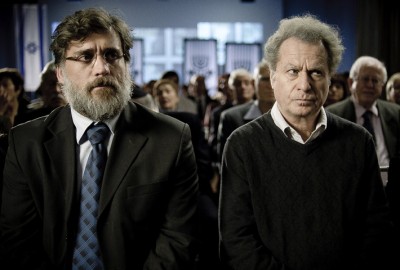
Please Note: The images used here are promotional stills provided by Sony Pictures Classics and are not taken from the Blu-ray edition under review.
One of the movie moments that made the deepest impressions on me as a youngster/budding cinephile was the few minutes in Woody Allen's Crimes and Misdemeanors where Judah (Martin Landau) revisits a scene from his childhood, one that pricks his now-sullied conscience. Around the dinner table, his Jewish family -- father and mother and aunts and uncles and siblings and cousins, atheist and observant alike -- debate and defend their diverging, conflicting positions on some very serious stuff: morality, human nature, the existence of god, the meaning(lessness) of human existence, the validity of this or that philosophy as a guide to living life properly. Now, the movies may not be the best, most accurate place to form one's impression of a people or a culture, but that scene (along with a number of others from Allen's oeuvre) gave me a rampant case of Judaism envy, or at least drew me strongly to what I naively inferred, generalized, and exoticized that culture and religion to be. How glamorous and foreign, in my experience, did it seem, discussing the most profound and serious matters as a part of everyday familial interaction? Watching the Israeli writer/director Joseph Cedar's recent film Footnote, I was taken back to Judah's childhood dinner table and beyond, to what felt like a closer-to-the-source glimpse of that intense interest in the Word and/or the Law; the debate about whether and in precisely what ways it's valid; and the endless, impassioned, knowledgeable scrutiny and study and questioning and discussion, with its oft-accompanying, lacerating irony, that seem to me to tie together most of the invaluable Jewish/Jewish-American culture we have, whatever its many other diversities, from Paul Goodman to Mr. Allen to Philip Roth to Ari Folman to Saul Bellow to David Grossman to Noam Chomsky. It's not even that Cedars's swift, buoyant, light-feeling film shares much in the way of tone with Allen's starker, more obviously weighty picture, but that tonal difference belies what the two films do have in common in the way of moral and philosophical concerns; it makes its reverberations at once more stealthy and more surprising than the ones Allen's offered, but no less inescapable for that.
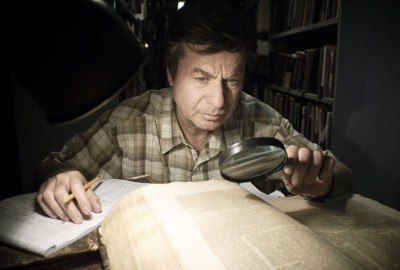
Cedar's deeply, ambivalently interlocked protagonists are, like Abraham and Isaac or Jacob and Joseph, father and son. What they share and what comes between them is less violent but perhaps no less deeply felt than their Biblical forebears: Both septuagenarian Eliezer Skolnick (Shlomo Bar-Aba) and his middle-aged son, Uriel (Lior Ashkenazi, Late Marriage) are presences in the venerated, insular academic world of Talmudic scholarship, a discipline devoted to the minutest details and the most stringent, strenuous debates over centuries of interpretation, reinterpretation, and commentary upon the Mosaic Law that, as tradition has it, goes all the way back to that important man's interaction on Mt. Sinai with the Man Upstairs. Despite his advanced age, Eliezer is still very agile and intent, shuffling rapidly, head down, to and from the National Library daily to continue his 40-years-and-counting studies. He's like clockwork, energetic and unfailingly consistent (all conveyed in few words and much physical characterization by the excellent Bar-Aba), and we'd never know, if the movie didn't digress into multiple flashbacks, voice-over explications, and mini character-introduction slideshows, that he'd once nearly tasted greatness via his painstaking reconstructions of a fragmented version of the Talmud, only to have those years of work swept away by a colleague's, Professor Grossman's (Micah Lewensohn), chancing upon a lost, complete version of the same text and receiving all the glory, neglecting to share any of it despite his full awareness of Eliezer's work. Now Grossman is a very high-up, authoritative figure while Eliezer shuffles his way to and from his obscure cubbyhole in the library stacks. The situation is compounded by the fact that Uriel is also much better-rewarded with prestige and popularity than his father has ever been, all of which, as Eliezer cannot avoid letting it be known, the elder Skolnick feels were gained through Uriel's cutting corners where he should have been severe and being nice to gain favor when he should have been ruthlessly honest, leading to appealing but worthless scholarship. A certain unremitting adherence to principle, without ever even the tiniest exception for any reason, is Eliezer's hard-and-fast definition of "integrity."
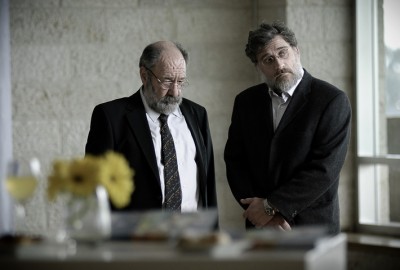
And it's their integrity, whatever their disparate definitions of the word, that is at stake for both Eliezer and Uriel because of the story's central, disastrous error, a clerical confusion that has led to Eliezer, as the film begins, being introduced by his son at an awards ceremony where the older gentleman is set to receive the prestigious Israel Prize for his Talmudic work. How did such a long-time loser -- 16 times nominated, never won, with his archrival, Professor Grossman, at the current head of the awards committee -- get to this point, and why does he look so miserable? The answer to both questions is that he has been named winner by mistake, the mistake has been willingly perpetuated by the real winner out of deference to Eliezer, and Eliezer, no dummy, has thought about it, looked into it, and become well aware that he is not the intended awardee. If this introductory honor and the strange behavior surrounding it -- Uriel's hyperbolic, oddly effusive public praise of his father, Eliezer's misery, Mrs. Skolnick's (Eliezer's wife's and Uriel's mother's) taciturn expression -- is the surface text of the film, Cedars makes all of its subsequent sequences into an experience for us that simulates the one this scholarly father and son must have routinely, that of digging through a text closely, looking between the lines for the hidden meaning, poring over the footnotes in search of the key that will unlock the story behind what an onscreen title pops us to tell us is "the most difficult day of Eliezer Skolnick's life." That title is just one of various techniques through which Cedar, cinematographer Yaron Schart, and editor Einat Glazer-Zarhin give the film its text-combing feel as we "read" these characters and research their conundrum and its implications: Certain sequences take the form of lists/outlines one might make when writing a paper, numbered and rapidly edited, with introductory titles like "A Few Things Worth Knowing About Eliezer Skolnick," in which the character's defining moments and motivations are compiled as evidence; others transform the frame to take the form of images and text flitting through a sort of microfiche projector like the one Elieizer must so often use (headphones on to block out any distracting sounds from the non-written world), with a zooming-in camera as our magnifying glass.
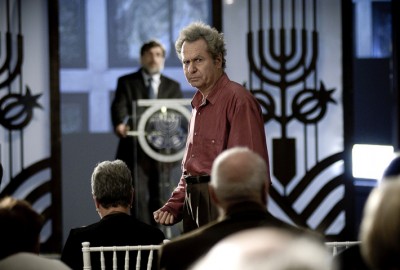
This bells-and-whistles style might at first seem jarring, even gimmicky, but as it turns out, it's the most thoughtful and apt use of such devices I've seen in a movie in quite a while; none of the increasingly deep, dark emotion of the film's revelations is lost, but it keeps us at enough of an amused distance to see all the absurd foibles, weaknesses, and blind spots in both Eliezer and Uriel and to maintain the film's comic-parable tone, as does Amit Poznansky's perfectly suited, mocking-fanfare score (which, in tandem with Schart's cinematography, becomes a supporting character unto itself and applies to the film's world of academia and intellectual honor some of the same half-satirical, heightened-reality treatment that was given to the game show milieu by Robert Elswit and Jon Brion in Paul Thomas Anderson's Magnolia). Whatever else is going on, Cedar never fails to exploit the comic potential of the film's painful situation, which ruthlessly lays bare the humorous disconnect between its characters' surface polite, dignified self-assurance and the murky, conflicted, at least partly shameful motivations the irreproachable-looking outward behavior is meant to banish or mask. At the same time, he seems effortlessly to bring out the pathos also inherent in that disconnect: such a carefully maintained self-image carries a cost to oneself and others when ironclad adherence to it is confronted with the compromised, messy real world and refuses to budge.
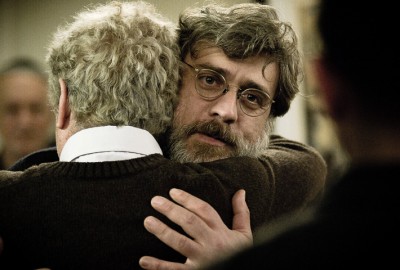
The difficult, dramatically rich questions that all this clever storytelling-as-textual-study-and-research are so sharply and intently dissecting (but never getting to the bottom of; the implication seems to be that there is no bottom, only an eternal, dialectical back and forth that's a necessary if unsatisfying end unto itself) are these: Does the unfairly overlooked, unfailingly principled and hardworking Eliezer deserve this grand prize, and, as a separate question integral to someone with such a strict view of Truth, does he have the right to it, even if it's offered up gladly by the actually intended honoree in deference to Eliezer's long and unjust neglect by the academic establishment? Will his rigid "integrity," the single core attribute that underlies and drives all of his punctilious work, succumb to his very understandable need for recognition and acceptance after having been shut out for so long, and if so, what will the prize really mean or be worth? Does the surprisingly insistent, passive-aggressive Uriel have more of his severe father, whose strictness he's so often painfully bumped up against, in him than he realizes or wants to admit? And, as the extent of the father's dedication to his truth-before-compassion ethos and the son's compassion-is-the-most-important-truth values are thrown into relief and tested to a degree neither of them would have willingly submitted to, we have to wonder, which of them had it right when they were more complacently sure of themselves, anyway? The film very funnily, very engagingly, very intelligently, and finally indelibly plays both of its sides against the middle, offering bounteous evidence in support of either way of looking at matters of principle, as well as the niggling, irreconcilable flaws in each. The way Footnote leaves you hanging in the end is thus not unsatisfying the way it would be at the conclusion of a lesser film that has led us to expect a simplistic, reassuring answer. Instead, it's as much of a bracing thrill as such carefully, symmetrically, yet dynamically honed moral perplexity can be. The way you're left with your mind's juices pumping and flowing by that moment of ultimate (in)decision when the screen cuts to black is physical testimony to the sting in this "light" film's tail, the shock to tenuous certainties about ethics and moral behavior and gray areas that leaves you keyed-up, buzzed, and arguing with yourself, like a guest at or eavesdropper on that stimulating, argumentative Crimes and Misdemeanors family dinner, for a long time after it's over.
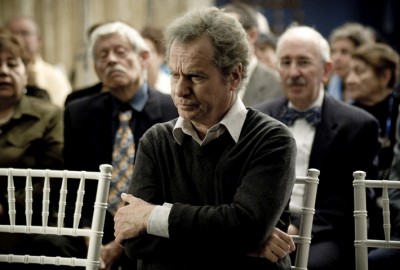
THE BLU-RAY DISC:
I'd venture to guess that the reason Sony Pictures has some of the best-looking Blu-rays around is Sony's early/proprietary relationship to Blu, but whatever the explanation, Footnote's transfer is right up there with the other spectacular-looking titles in Sony's charge (e.g., Incendies, The White Ribbon; even a not-great film like In A Better World at least looks great on a Sony Blu-ray). Presented as it is here, in an AVC-encoded, 1080p-mastered transfer at its original theatrical aspect ratio of 2.35:1, Footnote's every visual attribute is allowed to shine in just the way it was meant to -- the cool-to-warm (never very warm or hot) temperatures of Yaron Scharf's cinematography, with all the specific color qualities that implies, as well as the particular post-reduction digital-intermediate coloring and other finishing touches that give the film its aptly smooth look, come through with what looks like perfect fidelity to the print. All appropriate celluloid texture remains, and there isn't a trace of any sort of compression artifact flaw or other deficiencies to be seen anywhere; it's a genuinely stellar transfer.
Sound:The film's DTS-HD Master Audio soundtrack (in Hebrew with optional English subtitles) is equally top-notch to the visual dimension. All of the sound's layers, from the voice-over narration to the dialogue to the applause in an auditorium to Amit Poznansky's unusually important, supporting-character score is full and rich, sonorous, and enveloping, without a trace, at any point, of distortion or imbalance.
Extras:--"Behind the Scenes of Footnote," a 25-minute featurette in which snatches of the director, actors, and crew at work and being queried by the making-of director have been selected from throughout the shoot and compiled. Like any such supplement worth its salt, it gives us a close-in and privileged look at those mysterious, eternally fascinating, surprisingly nitty-gritty and intense processes that are orchestrated differently by every filmmaker and for every film -- all the preparation and work and anxiety and thought and concentration that finally result in the thing everyone's striving for in the work-intensive hours and days captured here: several hopefully well-realized, well-shot, well-acted minutes of movie.
--"An Evening with Joseph Cedar"> isn't actually that, but rather 10 minutes or so of selected responses from Cedar during a Q&A at the Toronto International Film Festival, in which he fields questions from the audience with a thoroughness and polite but firm honesty (he's not afraid to tell a questioner that their observation is interesting but wrong) that's of a piece with the same not-unkind but relentlessly probing, sharp, questioning sensibility that conceived of and pulled off a film with Footnote's resonances.
--The film's theatrical trailer and an assortment of the same for other fine Sony Pictures Classics offerings. (Seriously, this Indiewood studio has one of the best track records, especially for foreign films: this bunch of previews tempts you with, among others, A Separation and Whit Stillman's Damsels in Distress).

A moral parable that carries a deceptively breezy, chuckle-eliciting air, Joseph Cedar's Footnote carries a surprising depth and staying power as its secret cargo. It's part satire, part riddle, and part ethical/philosophical provocation, and it has a powerful undertow of the classically tragic (mutually exclusive, equally understandable motivations in a deadlock that cannot come to any good, no matter the good intentions at play) in its depiction of an Israeli father and son who both exist in the same rarefied world of Talmudic scholarship, which has its hierarchies and competitiveness and opposing values just like any but is additionally burdened with the need to appear well above and beyond all of that at all times. Some basic and timeless questions -- What is the right way to live? What does being a "good person" actually entail? Does integrity mean rigorousness or generosity? -- are raised subtly but very meaningfully by Cedar, without us suspecting the film's philosophical provocation until we're fully invested, lured in by Cedars's ingenious script, his playful and spry structuring and editing, and his wonderful cast, at the head of which we have two great Israeli actors (the well and rightly acclaimed Lior Ashkanazi as the son and the underappreciated and underused Shlomo Bar-Aba) making every scene ruefully funny or wincingly tender (often, exhilaratingly, both at once). It's not too often that a film that feels so light and is replete with real mirth (even encompassing some gags that ease over into slapstick territory) manages to build such a cumulative impact while staying perfectly true to its comedic self and fully in control of its tone throughout, but Footnote is just such a rare picture. In presenting for our amusement and contemplation an unsolvable moral puzzle that will easily cause a thousand impassioned discussions and even a few sleepless nights long after its plentiful laughs have been enjoyed, it can hold its intellectual, thematically profound own against even the most deadly serious of dramas. Highly Recommended.
|
| Popular Reviews |
| Sponsored Links |
|
|
| Sponsored Links |
|
|
| Release List | Reviews | Shop | Newsletter | Forum | DVD Giveaways | Blu-Ray | Advertise |
|
Copyright 2024 DVDTalk.com All Rights Reserved. Legal Info, Privacy Policy, Terms of Use,
Manage Preferences,
Your Privacy Choices | |||||||









